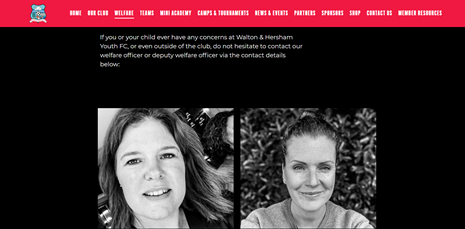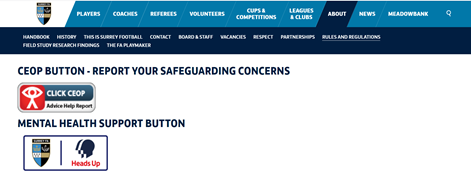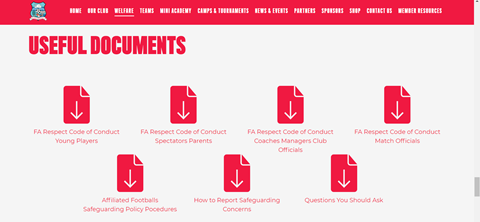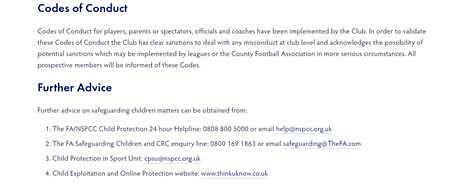
Safeguarding: Website Best Practice
The lockdown may be frustrating for many who are eager to return to the pitch and participate in grassroots football, but it does provide a great opportunity for clubs to get their administrative processes in order.
Our Designated Safeguarding Officer Phil Rendell has put together his top tips to get your club’s website up to scratch, based on examples of good practice from across the County.
Your club’s website is an important tool to communicate information to parents and players, and with more young people than ever having access to the internet on their own personal devices, it is a brilliant space to engage with them. For all the positive which come with this, the online space also presents risks to young people and vulnerable adults.
Wider education of online safety is hugely important and resources such as CEOP’s Thinkuknow should be highlighted to players. Safeguarding messaging is perhaps the most important content your website should contain, but it can often be overlooked or not given the same attention as other pieces.
Here are Phil’s top tips:
1. Ensuring your club’s welfare or safeguarding information can be easily found
“Make sure your club’s welfare or safeguarding information is easy to find on the website. It should be possible to navigate to the page in one click, as in the example below, or you could even create a separate tab. On this page it is really important that you make the contact details of your Club Welfare Officer [CWO] clear, as well as providing a clear explanation of the role of the CWO.”
2. A friendly face
“It is always nice to know who you are talking to. And when it comes to disclosing sensitive information or concerns, this is even more important. I would recommend displaying a photo of your welfare officer lead so that young people feel more comfortable. A photo where the welfare officer is smiling is recommended, as we’d all much rather speak to a friendly face.”
3. Make reporting simple
“Giving young people the ability to anonymously report their safeguarding concerns is essential. The good news is that there are already some fantastic tools out there to do just that. The CEOP reporting system is really easy to use, and we advise all of our clubs to add the CEOP reporting button to your website. Other great resources to link to include Childline’s information for reporting.”
4. Promoting The FA Respect Campaign and Club Code of Conduct
“Having a Code of Conduct is essential to running your club. These are the values which players, coaches and volunteers subscribe to when joining the club. Your code of conduct should include how you expect your players to act when representing the club and a clear understanding of what breaking the conduct means. Ensuring compliance with these key elements will go a long way to making your club a safe, welcoming environment to participants of all ages.”
“The FA’s Respect campaign is hugely important to ensuring good, safe behaviour on the pitch and respect for teammates, the opposition and officials. It encourages not only good conduct from players but also from coaches and spectators, to ensure our young people have a positive, supportive environment to play the sport they love. We would encourage clubs to support The FA’s Respect campaign and share the Respect Code of Conduct on their website.”
5. Safeguarding Policy
“The club’s safeguarding policy is an important piece of information which states what your club is doing to keep children safe, and the procedures you have in place around safeguarding. The key aspects this should set out a statement of your club’s commitment to protecting all children and the more detailed policies and procedures as to how you will do this and respond to child protection concerns. The FA have a really useful guide to creating this essential document.”
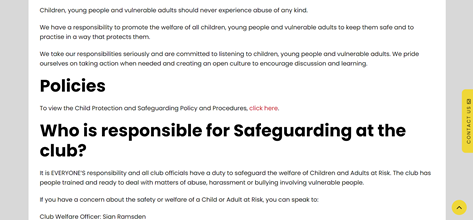
6. Contact details for other key organisations
“We don’t expect our clubs to have all the answers, and we certainly know that your website cannot house these. However, there are plenty of great resources and organisations out there. For starters, why not link through to The FA’s Safeguarding resources? Other organisations include NSPCC, Childline, CPSU, CEOP & Thinkuknow. In terms of helping young people to report safeguarding concerns, you may wish to add contact details for some of these on your website, such as the Childline number (0800 1111) or on Childline’s support page which allows children to chat 1-2-1 with a counsellor online.



